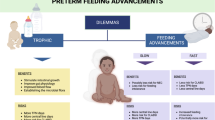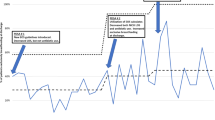Abstract
OBJECTIVE: Readmission of breastfeeding infants for hyperbilirubinemia and/or dehydration has been increasing in recent years. The purpose of the current study was to characterize the indications for and condition of these infants at readmission, and to determine factors present prior to initial hospital discharge which might have identified them to be at risk.
STUDY DESIGN: The records of 125 breastfeeding infants who were admitted to Children's Mercy Hospital from 1995 to 1997 in the first 2 weeks of life with diagnoses of hyperbilirubinemia, dehydration, or feeding problems were reviewed. Infants with hemolytic disease, infection, or other underlying causes were excluded.
At readmission, 80 infants had total bilirubin levels >342 μmol/l (20 mg/dl) and gestational age ≥38 weeks or total bilirubin levels >308 μmol/l (18 mg/dl) and gestational age <38 weeks. Forty-nine infants had a weight loss ≥12% from birth weight or a serum sodium concentration ≥145 mmol/l. Twenty-six infants had both hyperbilirubinemia and excessive weight loss or hypernatremia.
RESULTS: The mean gestational age of all infants was 38.6 weeks, 95% CI, 38.3 to 38.9 weeks. Mean length of initial hospital stay was 1.8 days (SD 1.03) for vaginally delivered infants compared with 3.4 days (SD 2.1) for those delivered by C-section (p=0.003). The Cesarean birth rate (9%) was disproportionally low in infants readmitted compared with overall C-section rate in Kansas City, MO (17%) (p=0.03). There was a significantly lower rate of readmission for infants whose initial hospital stay was ≥3 days (p=<0.002), but not for infants whose initial stay was ≥2 days (p=0.1). Infants admitted for hyperbilirubinemia only were at 38.3±1.6 weeks gestation compared with infants admitted for excessive weight loss or hypernatremia, 39.2±1.3 (p=0.06), and 1 day older, 5.4±1.9 days vs. 4.4±2.5 days (p=0.05).
CONCLUSION: This study confirms that prematurity and short hospital stays are risk factors for readmission of breastfeeding infants with hyperbilirubinemia and/or excessive weight loss and hypernatremia. An initial hospital stay ≥3 days was associated with a reduced risk for readmission of these infants.
This is a preview of subscription content, access via your institution
Access options
Subscribe to this journal
Receive 12 print issues and online access
$259.00 per year
only $21.58 per issue
Buy this article
- Purchase on Springer Link
- Instant access to full article PDF
Prices may be subject to local taxes which are calculated during checkout
Similar content being viewed by others
Author information
Authors and Affiliations
Rights and permissions
About this article
Cite this article
Hall, R., Simon, S. & Smith, M. Readmission of Breastfed Infants in the First 2 Weeks of Life. J Perinatol 20, 432–437 (2000). https://doi.org/10.1038/sj.jp.7200418
Published:
Issue Date:
DOI: https://doi.org/10.1038/sj.jp.7200418
This article is cited by
-
Neurodevelopment and asymmetry of auditory-related responses to repetitive syllabic stimuli in preterm neonates based on frequency-domain analysis
Scientific Reports (2019)
-
Predicting neonatal hyperbilirubinemia using first day serum bilirubin levels
The Indian Journal of Pediatrics (2010)
-
Significant weight loss in breastfed term infants readmitted for hyperbilirubinemia
BMC Pediatrics (2009)



